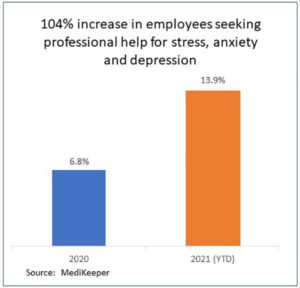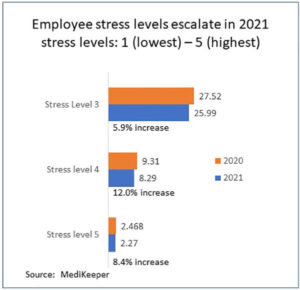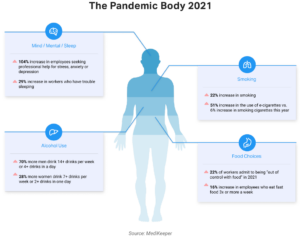A comprehensive analysis of the state of wellness and wellbeing indicators among today’s workforce.
About the MediKeeper Workplace Wellness Benchmark Report
The inaugural MediKeeper Workplace Wellness Benchmark Report is based on anonymized insights from a subset of employees who opted to complete a National Committee for Quality Assurance (NCQA) certified Health Risk Assessment (HRA) offered by their employer. MediKeeper drew on responses from 67,118 employees who completed the HRA. The HRA covers a range of topics beyond Mental Health and Stress, and MediKeeper will be releasing other reports focusing on Employment/Jobs, Personal Health/Wellness and Personal Relationships/Connections.
Part 1: released April 21, 2021
Insights from MediKeeper Health Risk Assessment Shows 104% Increase in Employees Seeking Professional Help for Stress, Anxiety or Depression in 2021
With Mental Health Month fast approaching in May, MediKeeper has released part one of its 2021 Workplace Wellness Benchmark Report, a comprehensive analysis of the state of wellness and wellbeing indicators among today’s workforce, focusing on mental health indicators, including stress, anxiety and depression. These data represent anonymized insights from more than 67,000 employees who opted to complete MediKeeper’s National Committee for Quality Assurance (NCQA) certified Health Risk Assessment (HRA) optional mental health section offered by their employer. MediKeeper provides workplace wellness technology used by more than 11 million people at work that helps them make smarter health-related decisions. To read the release in its entirety, please click here.


Other Resources:
- Article: Quarantine Stress – How To Deal With Burn-Out
- Article: How Your Wellness Program Can Reduce Work-Related Stress
- Article: Simple Strategies For Managing Stress In The Workplace
- White Paper: Best Practices for Wellness Programs
Part 2: released May 25, 2021
The Pandemic Body: More Fast Food, Alcohol and Smoking, Less Exercise and Difficult Sleep. MediKeeper Health Risk Assessment Insights Reveal an Epidemic of Unhealthy Behaviors Emerging During the Pandemic: 1 in 5 Workers Admit to Being “Out of Control with Food” in 2021
MediKeeper’s HRA data shows that 8.7% of employees reported they were worried about their health or an injury in 2020. However, this number grew by 18.2% in the first months of 2021, based upon the experience of employees who completed an HRA between January 1 to March 11, 2021. In addition, an alarming 22.1% of employees admitted to being “out of control with food” in 2021, a new question asked in the HRA this year to gauge the impact of remote work on employees. This metric equates to the 16.1% increase in employees who eat at a fast-food restaurant more than 3 times a week in 2021. To read the release in its entirety, please click here.

Other Resources:
- White Paper: Four Emerging Employee Wellness Trends for 2021
- White Paper: COVID19 – Lessons Learned About Workplace Wellbeing and the Pandemic
- Article: What is a Wellness Portal?
- Article: 20 Simple Health Habits You Can Start Practicing Today
Part 3: released June 23, 2021
Ch-Ch-Changes at Work and Home Put Employees in Stress Crosshairs: How HR Can Help
MediKeeper Health Risk Assessment Insights Reveal Large Increases in Job Loss, Career Changes and Divorce in the Wake of the COVID-19 Pandemic
Achieving work-life blending has never been more challenging for employees than during the COVID-19 pandemic, which has disrupted all aspects of daily life. To understand the pressures employees are facing today, MediKeeper has released the third and final part of its 2021 Workplace Wellness Benchmark Report, a comprehensive analysis of the state of wellness and wellbeing indicators among today’s workforce, focusing on employment, family life and personal connections. These data represent anonymized insights from employees who opted to complete MediKeeper’s National Committee for Quality Assurance (NCQA) certified Health Risk Assessment (HRA). MediKeeper provides workplace wellness technology used by more than 11 million people at work that helps them make smarter health-related decisions. To read the release in its entirety, please click here.
Other Resources:
